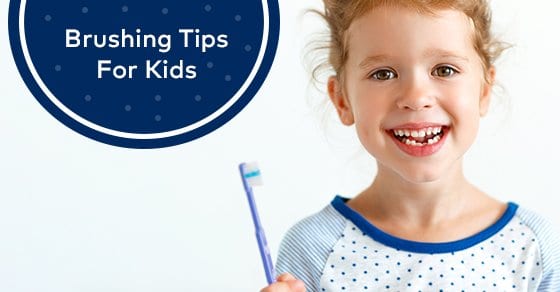As soon as your child’s teeth begin to grow in, they’ll need to be cleaned regularly.
In fact, the earlier you start, the easier it will be to get your child used to the process and ingrain in them good dental health habits!

For the first few teeth, many dentists will recommend using a soft washcloth wrapped around your finger in order to protect your baby’s sensitive gums, but once several teeth have come in, it will be time to switch to traditional brushing.
By the time your child is about six or seven, they will likely be able to start brushing for themselves and, at this point, the best thing you can do is to lead by example. Let them see you carefully brushing and flossing your teeth in the morning and before bed in order to encourage similar behaviors. For more ideas to keep them motivated, try these ways to keep kids interested in oral health.
Before your child reaches this age, their teeth are your responsibility. In order to help you take the best possible care of your baby’s teeth, here are some helpful tips:
-
- Choosing toothbrushes
When choosing a toothbrush for your child, always be sure to opt for the soft-bristled kind to protect their sensitive gums.
A small, child-sized toothbrush soaked in warm water before brushing is the best option for small, delicate mouths.
-
- How much toothpaste?
Children under the age of three should require only a tiny amount of toothpaste to keep their teeth clean. The Canadian Dental Association recommends using about the amount of a single grain of rice once the first tooth appears.
Around the age of three, parents should increase this amount to about a pea-sized amount.
-
- Frequency of brushing
Just like adult teeth, children’s teeth should be brushed at least twice a day: right after breakfast and again just before bed.
You should spend about two minutes on this task with the focus being on the back molars where cavities often form first. It also helps to be aware of the hidden causes of cavities in kids.
-
- Replacing toothbrushes
Whenever your child’s toothbrush begins to show wear – usually every three to four months – it should be replaced. Never share toothbrushes between multiple children. This is one of several daily oral hygiene tips that protect your child’s smile.
-
- Flossing and mouthwash
As soon as your child had two teeth which touch, it is time to begin flossing. Floss sticks or picks will likely be easier on both you and your child as they get used to the process. To make it easier to build the habit, here are simple tricks to teach kids good oral hygiene.
Mouthwash is not recommended for any children under the age of about six as they likely will not have the motor skills to spit and rinse.
-
- Visits to the dentist
Most children should begin visiting the dentist regularly around at one year old, or within six months of their first tooth coming in (here’s more on when your child should first see a dentist). This will help you to ensure that your child’s oral health is well taken care of and any potential problems are dealt with as soon as possible. If nerves are a concern, try these tips to get your child excited for the dentist.